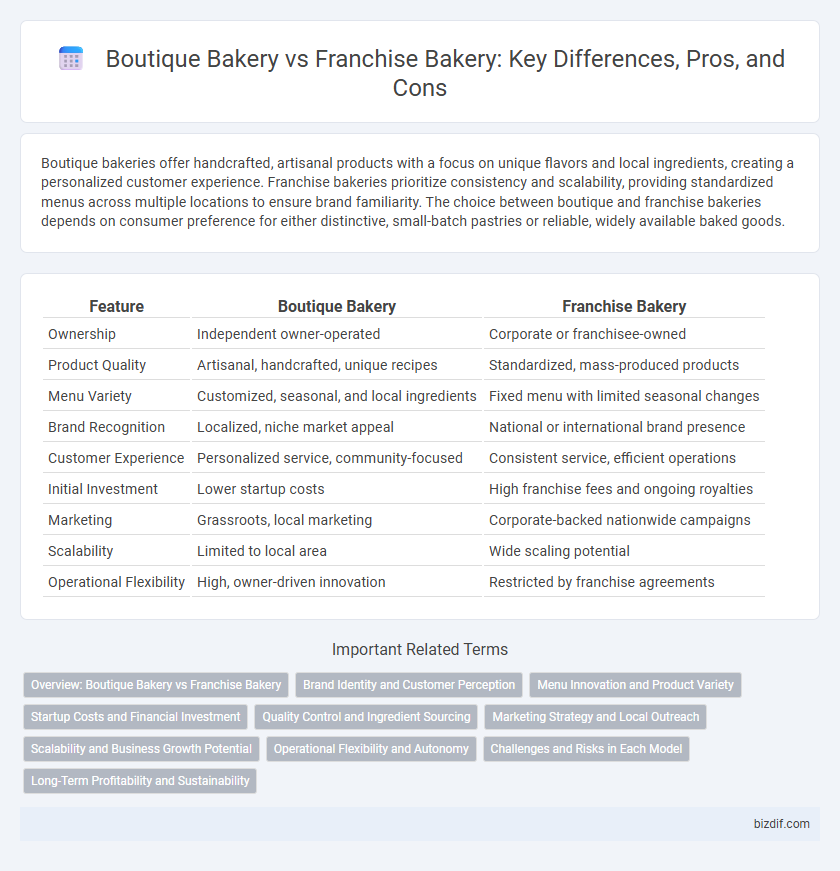Boutique bakeries offer handcrafted, artisanal products with a focus on unique flavors and local ingredients, creating a personalized customer experience. Franchise bakeries prioritize consistency and scalability, providing standardized menus across multiple locations to ensure brand familiarity. The choice between boutique and franchise bakeries depends on consumer preference for either distinctive, small-batch pastries or reliable, widely available baked goods.
Table of Comparison
| Feature | Boutique Bakery | Franchise Bakery |
|---|---|---|
| Ownership | Independent owner-operated | Corporate or franchisee-owned |
| Product Quality | Artisanal, handcrafted, unique recipes | Standardized, mass-produced products |
| Menu Variety | Customized, seasonal, and local ingredients | Fixed menu with limited seasonal changes |
| Brand Recognition | Localized, niche market appeal | National or international brand presence |
| Customer Experience | Personalized service, community-focused | Consistent service, efficient operations |
| Initial Investment | Lower startup costs | High franchise fees and ongoing royalties |
| Marketing | Grassroots, local marketing | Corporate-backed nationwide campaigns |
| Scalability | Limited to local area | Wide scaling potential |
| Operational Flexibility | High, owner-driven innovation | Restricted by franchise agreements |
Overview: Boutique Bakery vs Franchise Bakery
Boutique bakeries offer artisanal products crafted with unique recipes, emphasizing quality, customization, and a personalized customer experience. Franchise bakeries operate on standardized recipes and processes across multiple locations, prioritizing brand consistency, scalability, and broad market reach. The choice between boutique and franchise bakeries depends on goals related to product uniqueness, customer engagement, and operational control.
Brand Identity and Customer Perception
Boutique bakeries cultivate a unique brand identity through artisanal products, personalized service, and locally inspired flavors that foster strong emotional connections with customers. Franchise bakeries leverage established brand recognition and standardized offerings, promoting consistency and reliability but often lacking the distinctiveness that defines boutique experiences. Customer perception of boutique bakeries emphasizes craftsmanship and authenticity, while franchise bakeries are viewed as convenient and trustworthy options for familiar baked goods.
Menu Innovation and Product Variety
Boutique bakeries often prioritize menu innovation by crafting unique, artisanal products that reflect local flavors and seasonal ingredients, catering to niche markets and culinary trends. Franchise bakeries typically offer standardized menus with limited product variety to ensure consistency and brand recognition across multiple locations. The contrast lies in boutique bakeries' experimental approach to new recipes versus franchise bakeries' emphasis on proven, mass-appeal items.
Startup Costs and Financial Investment
Boutique bakeries often require lower startup costs, typically ranging from $50,000 to $150,000, due to smaller scale operations and personalized branding efforts. Franchise bakeries demand higher initial financial investment, commonly between $200,000 and $500,000, which covers franchise fees, mandatory equipment, and established marketing expenses. Financial planning for boutique bakeries emphasizes custom equipment and local sourcing, whereas franchises allocate funds toward standardized systems and royalty payments.
Quality Control and Ingredient Sourcing
Boutique bakeries prioritize artisanal quality control, ensuring each product is crafted with meticulous attention to detail and often using locally sourced, organic ingredients that enhance flavor and freshness. Franchise bakeries rely on standardized quality protocols and bulk ingredient sourcing to maintain consistency across multiple locations, which can sometimes compromise ingredient quality. This difference in ingredient sourcing and quality control directly impacts the taste, texture, and overall consumer experience at boutique versus franchise bakeries.
Marketing Strategy and Local Outreach
Boutique bakeries leverage personalized marketing strategies that emphasize artisanal quality and community engagement, often using social media and local events to build loyal customer bases. Franchise bakeries implement standardized marketing campaigns with broad reach, utilizing established brand recognition and mass promotions to attract customers across multiple locations. Local outreach for boutique bakeries includes collaborations with neighborhood businesses and participation in farmers markets, while franchises focus on consistent branding and nationwide advertising efforts.
Scalability and Business Growth Potential
Boutique bakeries offer unique, artisanal products with limited scalability due to their emphasis on handcrafted quality and local market focus, often resulting in slower business growth. Franchise bakeries benefit from standardized operations and brand recognition, enabling rapid expansion and scalable business models across multiple locations. The potential for franchise bakery growth significantly outweighs boutique bakeries by leveraging economies of scale, consistent product offerings, and centralized supply chain management.
Operational Flexibility and Autonomy
Boutique bakeries offer greater operational flexibility and autonomy, allowing owners to experiment with unique recipes and adapt quickly to local customer preferences. Franchise bakeries operate under strict guidelines and standardized processes set by the franchisor, limiting customization but ensuring consistent product quality across locations. This structured approach supports scalability and brand recognition but reduces the ability to innovate independently.
Challenges and Risks in Each Model
Boutique bakeries face challenges such as limited brand recognition and higher dependency on local customer loyalty, which can restrict expansion and revenue growth. Franchise bakeries encounter risks related to maintaining consistent product quality and brand standards across multiple locations, often facing legal and operational complexities due to franchise agreements. Both models must navigate supply chain management and fluctuating ingredient costs, but boutiques emphasize artisanal uniqueness while franchises prioritize scalability and standardized operations.
Long-Term Profitability and Sustainability
Boutique bakeries often achieve long-term profitability through unique product offerings and strong local customer loyalty, fostering sustainable growth based on quality and brand differentiation. Franchise bakeries benefit from established brand recognition and streamlined operations, allowing for faster scalability but facing potential challenges with maintaining consistency and community connection. Sustainable success in either model depends on balancing operational efficiency with customer engagement and adapting to market trends.
Boutique bakery vs Franchise bakery Infographic

 bizdif.com
bizdif.com